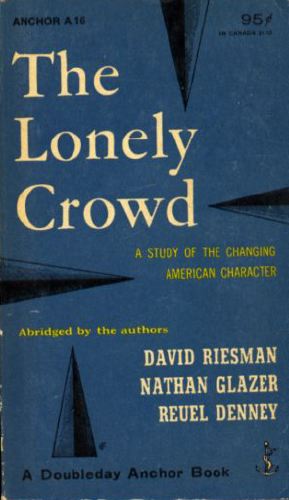
The Lonely Crowd: A Study of the Changing American Character (1953) [1950])
By David Riesman, Nathan Glazer, and Revel Denney
Synopsis: This book is about "social character and about the differences in social character between men of different regions, eras, and groups" (page?). It is concerned largely with the decline of the nineteenth-century style of inner-directed character and the rise of the new outer-directed type. The book is based on interview and community studies, poll data, histories, biographies, and novels, and is basically a study of broad trends as seen by the authors. Argues that there are three types of characters: 1) tradition-directed (shaped by massive social forces and tradition), 2) inner-directed (shaped mostly by family and has more options; strong sense of autonomy); 3) other-directed (gets moral code from many different sources, so has diffuse and changeable sense of morality; will go with the flow and has more shallow existence). Authors argue that the move towards other-direction is mostly due to capitalism, industrialism, and urbanization - and the dominance of consumption over production. Another big thread of this book is that we don't have enough serious play going on, and that we need avocational counselors to teach people how to play better (342). They also want cities to be more than mere sites of work. The bottom line is that a true sense of meaning and interestingness can only derive from a deep sense of individual autonomy - we need to be more like ourselves instead of like other people. "The promising alternative to other-direction...is not inner-direction, but autonomy" (188). [How Emersonian!] The last line of the book is interesting: "The idea that men are created free and equal is both true and misleading: men are created different; they lose their social freedom and their individual autonomy in seeking to become like each other" (349). [That's so American!]
Interacts With:
Bowling Alone (in its focus on broad trends over time), Culture of Narcissism, Habits of the Heart, Middletown and Middletown in Transition, The Levittowners,
Actually, I see this now as a book about the transition from modernism to postmodernism. It's not that the other-directed person has no sense of self, but rather that his sense of self is multivalent and more pluralistic/complex/multifaceted.
Actually, also interacts with Urban Masses and Moral Order, Rudeness and Civility, and all those other books about nineteenth-century urbanism and the impact this had on the senses and on one's sense of self. An assault on the senses leads to increasingly scattered and perhaps superficial attempts to decipher meaning from the vast melange of signs all around oneself. The outer-directed person today seems to be too fluid and transient to really experience anything in a deeply meaningful way - hence his inability to really "play" well.

No comments:
Post a Comment